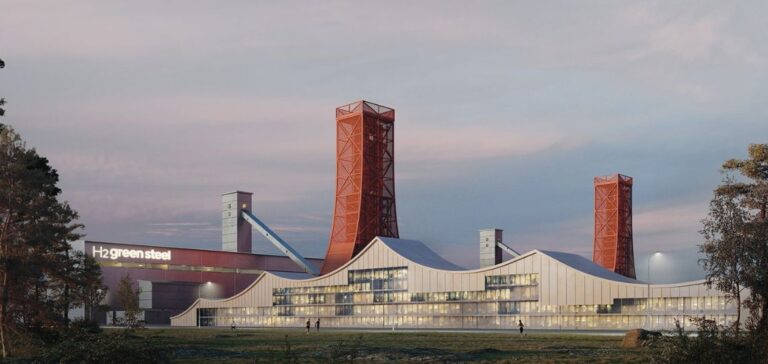Swedish hydrogen steel project H2 Green Steel announced on Thursday that it had raised 1.5 billion euros to complete the financing for the construction of Europe’s first large-scale electrolyzer. It will create the first steelworks “in decades” on the Old Continent, according to the group.
H2 Green Steel Announces Historic Fundraising for its Decarbonized Steel Project
Launched in 2020, it is due to come on stream at the end of 2025 at Boden in northern Sweden, said H2 Green Steel in a press release. This new process, which uses hydrogen produced from hydropower, is expected to reduce steel’s CO2 emissions by up to 95% compared with those produced by traditional blast furnaces that use coal to deoxidize iron ore. If implemented across the board, it should help green steelmaking, which accounts for 7% of man-made CO2 emissions worldwide, making it the world’s biggest source of industrial emissions.
According to H2 Green Steel’s press release, the financing – “the largest private fundraising in Europe this year” – has been made possible by the hydrogen fund Hy24, the Altor fund, which operates mainly in the Nordic countries, Germany, Austria and Switzerland, the Singaporean fund GIC, and the Just Climate fund, an investment company whose ambition is to invest in the most carbon-intensive sectors of heavy industry in order to decarbonize them. The breakdown of investments has not been made public.
H2 Green Steel Attracts Automotive Giants and Redefines Europe’s Steel Industry
To date, the company has raised 1.8 billion euros in equity and received 3.5 billion euros in bank loans. It will be “the first steel plant to be built in Europe in decades”, stressed Pierre-Etienne Franc, CEO of Hy24, pointing out that the key to the success of a project of this scale is “the low price of electricity” as well as “the proximity of iron ore and a port”.
“This marks the beginning of industrial-scale decarbonization of basic materials production,” summarized Otto Gernandt, CFO of H2 Green Steel.
“As a long-term investor, we are committed to providing capital to develop solutions that help decarbonize the real economy,” added Choo Yong Chen, head of private equity investments at GIC, quoted in the release.
The big names in the German automotive industry have signed up as customers, including Mercedes, BMW and Swedish manufacturers Scania and Electrolux. Other projects of this type exist in Europe, notably at Fos-sur-mer in southern France, led by a consortium formed by the European incubator EIT InnoEnergy with Engie and Forvia. Traditional steel players like ArcelorMittal also have their own decarbonization plans, based on similar technologies.
Why does it matter?
On the eve of the construction of Europe’s first carbon-free steel mill in decades, this Swedish project marks a significant step towards reducing CO2 emissions in the steel industry. If successful, it could not only significantly reduce the environmental impact of steel production, but also set an example for other heavy industries seeking to decarbonize their manufacturing processes. This underlines the growing importance of investment in sustainable solutions for the future of industry and the economy as a whole.






















